|
|
|
Sort Order |
|
|
|
Items / Page
|
|
|
|
|
|
|
| Srl | Item |
| 1 |
ID:
069691


|
|
|
| 2 |
ID:
164776
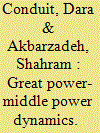

|
|
|
|
|
| Summary/Abstract |
Iran is expected to be one of the main beneficiaries of China’s Belt and Road Initiative (BRI). China and Iran had a track record of cooperation long before the announcement of BRI, developing a highly asymmetric Great Power-Middle Power partnership over the course of three decades. This article asks whether BRI will enable China and Iran to transcend the limitations faced by most Great Power-Middle Power relationships on the basis of Iran’s enhanced strategic economic and geographic value. It is argued that while BRI could benefit from stronger China–Iran ties, Iran’s international posturing has proven a significant hindrance to China, highlighting that entrenched patterns of engagement in Great Power-Middle Power relations are not easily shifted, even in the face of immense economic incentives.
|
|
|
|
|
|
|
|
|
|
|
|
|
|
|
|
| 3 |
ID:
061690


|
|
|
|
|
| Publication |
Lanham, Scarecrow Press, 2002.
|
| Description |
xxxiv, 284p.
|
| Series |
Asian/Oceanian historical dictionaries; no.38
|
| Standard Number |
0810841843
|
|
|
|
|
|
|
|
|
|
|
|
Copies: C:1/I:0,R:0,Q:0
Circulation
| Accession# | Call# | Current Location | Status | Policy | Location |
| 049615 | 958.6/ABD 049615 | Main | On Shelf | General | |
|
|
|
|
| 4 |
ID:
177850
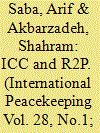

|
|
|
|
|
| Summary/Abstract |
The ICC and R2P share the goal of ending atrocity crimes. Nonetheless, they operate quite differently. Recently, there has been increasing support for bringing the ICC within the R2P toolkits, hoping they will complement each other to achieve their shared goal. The Security Council put this idea into practice to deal with the 2011 crisis in Libya. However, the invocation of ICC against the backdrop of an evolving military intervention under the R2P mandate highlighted significant risks to its integrity and legitimacy. This paper argues that the invocation of ICC to constrain violence and to hold accountable the Libyan regime for atrocity crimes eventually resulted in legitimizing military intervention and regime change under the R2P mandate. The Libya case suggests that neither the push for complementarity nor a full separation between the ICC and R2P benefits the ICC. There needs to be a balance between full engagement and separation. Such an alternative rests on the ICC avoiding entanglement with R2P’s military mandate, while maintaining close interaction with its non-military components through the Security Council. Lastly, the paper also points to areas in which the Council could play a more constructive role in cementing greater cooperation between R2P and the ICC.
|
|
|
|
|
|
|
|
|
|
|
|
|
|
|
|
| 5 |
ID:
175589


|
|
|
|
|
| Summary/Abstract |
The proliferation of jihadist groups raises intriguing questions about their internal relationship. Drawing on Resource Mobilization Theory we explore this question by examining the relationship between the Taliban and the local incarnations of the Islamic State of Iraq and Syrian (ISIS) in Afghanistan. We conceive the Taliban and ISIS as parts of a broader “jihadist movement industry” that is simultaneously united and divided by the logic of their embeddedness in the movement. While most existing research emphasizes intra-jihadist conflict or rivalry, we found that the relationship between the two groups goes through cyclical shifts, vacillating between conflict and cooperation.
|
|
|
|
|
|
|
|
|
|
|
|
|
|
|
|
| 6 |
ID:
142174
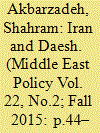

|
|
|
|
|
| Summary/Abstract |
President Hassan Rouhani came to office in 2014 with a popular mandate to relieve Iran's international isolation. His electoral campaign focused on ending the crippling sanctions Iran has suffered due to the ongoing dispute over its nuclear program. Rouhani promised to make “moderation” the centerpiece of his government, but breaking out of isolation has proven to be much more difficult than the reform-inclined Rouhani government expected. The Arab upheaval has morphed into sectarian warfare, championed by the Islamic State of Iraq and Syria (“Daesh” in Arabic and Persian). This conflict has presented Iran with a most unwanted problem. From its inception, Iran has projected itself as a champion of the whole Muslim community. It has stayed clear of sectarian disputes with its Sunni neighbors and presented its disagreements with Saudi Arabia, for example, in terms of global Muslim interests. It highlighted the failure of U.S.-friendly Arab leaders to protect the Palestinians as the cardinal charge against them. Their Sunni affiliation was not the issue. However, the bloody sectarian conflict in Iraq and Syria, with spot fires in other states, has forced Iran to engage with the sectarian issue. Events of the past few years have made it impossible for Iran to ignore the schism. This complicates President Rouhani's task: his promised mantra of “prudence and hope” (tadbir va omid) has effectively been sidelined in the context of forming a Daesh policy. Iran is forced into relying on its Shia allies to respond to the threat posed by Daesh, making Iran a reluctant Shia power in the region.
|
|
|
|
|
|
|
|
|
|
|
|
|
|
|
|
| 7 |
ID:
138162
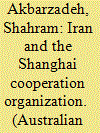

|
|
|
|
|
| Summary/Abstract |
The Islamic Republic of Iran has pursued full membership in the Shanghai Cooperation Organisation (SCO). In doing so, Iran has appeared to be unfazed by the prospect of allying with Russia and China, two countries which have systematically suppressed their Muslim minorities for decades. Similarly, the SCO's Central Asian member states are led by individual leaders who are generally believed to rule in spite of their populations. As a result, Iran's eagerness to join the SCO may appear to contradict its self-promoted image as the champion of Muslim interests, but in reality it sits nicely within its overarching enmity for the USA. Indeed, the SCO is seen as a geopolitical counterweight to the USA. For Iran, this geopolitical opportunity overrides ideological imperatives, with the gap between ideology and geopolitics most evident under the presidency of Mahmoud Ahmadinejad.
|
|
|
|
|
|
|
|
|
|
|
|
|
|
|
|
| 8 |
ID:
152087
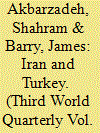

|
|
|
|
|
| Summary/Abstract |
The rise and subsequent erosion of friendly relations between Iran and Turkey was a result of their regional ambitions. While Turkey had long seen its secular system as presenting an alternative to Iran’s Islamic ideology, the alignment of their regional interests facilitated a rapport between the two states in the first decade of the twenty-first century. However, the Arab Spring proved divisive for this relationship as each state sought to advocate its model of government and secure a leadership role in the Arab world. The war in Syria widened the divide, as Iran’s long-standing support for the Bashar al-Assad regime could not be reconciled with Turkey’s desire to see President Assad out of office. Using a close reading of Persian and Turkish sources, the authors will analyse the Iran–Turkey divide, focusing specifically on how the Iranians have portrayed it as a clash of civilisations, citing Turkey’s so-called ‘neo-Ottoman’ ambitions as the primary cause.
|
|
|
|
|
|
|
|
|
|
|
|
|
|
|
|
| 9 |
ID:
190778
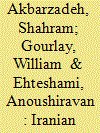

|
|
|
|
|
| Summary/Abstract |
This article examines Iran’s ‘forward-defence’ strategy, in particular its deployment of proxy forces in the Syrian conflict. Iran’s expanded presence in regional conflicts is regarded by its adversaries as indication of hegemonic intent, while Tehran posits its regional posture as a defensive response to security threats. We argue that Iran’s ‘forward-defence’ strategy offers practical benefits, shaping strategic realities, and performative benefits, allowing Tehran to propagate a discourse of military fortitude. On balance, however, the strategy has fed suspicions of Iran’s intentions and increased hostility towards the Iranian leadership, thus is likely to be counterproductive.
|
|
|
|
|
|
|
|
|
|
|
|
|
|
|
|
| 10 |
ID:
156277


|
|
|
| 11 |
ID:
076225
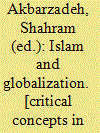

|
|
|
|
|
| Publication |
London, Routledge, 2006.
|
| Description |
v1(xvii, 372p.); v2(ix, 342p.); v3(viii, 313p.); v4(viii, 406p.)
|
| Contents |
Vol 1: Culture and identity
Vol 2: Politics and governance
Vol 3: Global order
Vol 4: The economy and law
|
| Standard Number |
0415353572
|
|
|
|
|
|
|
|
|
|
|
|
Copies: C:4/I:0,R:4,Q:0
Circulation
| Accession# | Call# | Current Location | Status | Policy | Location |
| 052289 | 297.27/AKB 052289 | Main | On Shelf | Reference books | |
| 052290 | 297.27/AKB 052290 | Main | On Shelf | Reference books | |
| 052291 | 297.27/AKB 052291 | Main | On Shelf | Reference books | |
| 052292 | 297.27/AKB 052292 | Main | On Shelf | Reference books | |
|
|
|
|
| 12 |
ID:
090874


|
|
|
|
|
| Publication |
2009.
|
| Summary/Abstract |
President Barack Obama has inherited an unenviable legacy in relation to Iran. Relations between Iran and the United States have suffered blow after blow in the last three decade.
|
|
|
|
|
|
|
|
|
|
|
|
|
|
|
|
| 13 |
ID:
062176


|
|
|
| 14 |
ID:
176578
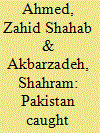

|
|
|
|
|
| Summary/Abstract |
Pakistan claims to maintain neutrality in the Iran–Saudi rift. Sustaining this approach, however, has been problematic against a backdrop of intensifying Iran–Saudi rivalry. Pakistan’s choices suggest a tilt towards Saudi Arabia. Based on extensive fieldwork in Islamabad, this paper focuses on the meanings and uses of neutrality in Pakistan’s foreign policy. The paper argues that Pakistan cannot be neutral due to its stronger cultural, economic and defence ties with Saudi Arabia but it promotes this rhetoric due to a combination of demographic, geographic and geopolitical factors. Islamabad’s claim of neutrality serves the dual purpose of the national interests in relation to domestic and foreign affairs. Based on its economic, sectarian and geopolitical realities, Pakistan desires a neutrality in the Iranian-Saudi rivalry but it is very difficult because it has strong and multifaceted relations with Saudi Arabia. Based on the assessment of Pakistan’s foreign policy choices, we argue that Pakistan continues to lean away from Iran towards Saudi Arabia.
|
|
|
|
|
|
|
|
|
|
|
|
|
|
|
|
| 15 |
ID:
020989
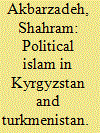

|
|
|
|
|
| Publication |
2001.
|
| Description |
451-465
|
|
|
|
|
|
|
|
|
|
|
|
|
|
|
|
| 16 |
ID:
174898


|
|
|
|
|
| Summary/Abstract |
Four decades after the establishment of the Islamic Republic of Iran, a wealth of scholarship exists detailing the failures and achievements of the ruling clergy. Such lines of inquiry explore not only the economic, political and foreign policies of the clerical establishment, but also the performance of the ruling clergy in the religious sphere. However, an important matter that has attracted scant interest is the ruling clergy’s policies regarding the Shi’i traditional orthodoxy, that is, their fons et origo. Reminding readers that governmental-Shi’ism emerged as a marginal discourse within the Shi’i seminary in the 1970s, this paper explains how the ruling clergy waged a calculated campaign aimed at transforming the flexible, pluralistic and independent nature of the traditional orthodoxy into a system dependent upon the state and submissive to its government-centric reading of Shi’ism. We argue that the ruling clergy have succeeded in establishing and making state-sponsored institutions important players in the seminary and Shi’i establishment. However, they have failed to abolish the traditional orthodoxy in which distance and independence from the state have remained foundational features.
|
|
|
|
|
|
|
|
|
|
|
|
|
|
|
|
| 17 |
ID:
158107


|
|
|
|
|
| Summary/Abstract |
There is a widespread assumption that, given the imminent threat of mass atrocities against the Libyan civilians – especially in Benghazi – and in the absence of non-military alternatives, military action against the regime of Muammar Gaddafi was a justified and necessary response. This paper challenges this widespread assumption. It argues that on the eve of NATO-led military intervention, there was no ‘clear evidence’ to suggest that the Libyan regime was on the verge of committing mass atrocities against civilians. This research also documents the range of political and diplomatic options open to the international community to engage with Gaddafi, all of which were sidetracked in favour of military action. Despite the brutality of Gaddafi’s rule, military intervention in Libya did not meet the Responsibility to Protect’s (R2P) ‘just cause’ and ‘last resort’ criteria. Far from being a successful application of R2P’s most coercive pillar, the Libyan case was a manifest misapplication of R2P's military component. An objective analysis of the Libyan crisis during February and March 2011 should have prevented the use of military force.
|
|
|
|
|
|
|
|
|
|
|
|
|
|
|
|
| 18 |
ID:
189523
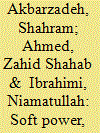

|
|
|
|
|
| Summary/Abstract |
The concept of soft power was developed at the end of the Cold War to examine international influence through non-coercive means. In recent years, a growing field of research has drawn on this concept to examine the role of religion and culture in the foreign policies of Middle Eastern states. The existing research tends to view soft power from the perspectives of states that project such influence, not the impact of these policies on target societies, and tends to overlook the relationship between hard and soft power strategies. To address this gap, we draw on an original survey data and face-to-face interviews to evaluate Iran’s influence in Afghanistan. This study examines the response in Afghanistan to key pillars of Iranian soft power projection: the role of shared language and culture, religion and Tehran’s Third Worldist ideology of resistance against Western powers. This research finds that Iran’s soft power projection strategy is undermined by structural hard power imbalances between the two countries and Tehran’s contradictory policies towards Afghanistan.
|
|
|
|
|
|
|
|
|
|
|
|
|
|
|
|
| 19 |
ID:
171323
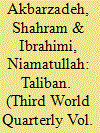

|
|
|
|
|
| Summary/Abstract |
Iran has pursued a highly contradictory policy towards Afghanistan. On the one hand, it became a significant beneficiary of the overthrow of the Taliban regime by the US-led military intervention in 2001 in Afghanistan. The new Afghan government established cordial ties with Iran, allowing it to expand its political, economic and cultural influence in the country. Yet Iran has also provided significant support to the Taliban in its campaign to violently upend the political, social and economic processes in the country. This article examines the underlying domestic and regional security dynamics that contribute to this contradictory behaviour. It offers an assessment of how tensions between the United States and the Islamic Republic, as well as Tehran’s growing threat perception following the rise of the Islamic State – Khorasan in 2014, impact on Iran’s policy towards the Taliban. The paper argues that Tehran views the Taliban as an instrument to disrupt the influence of other actors in Afghanistan. The instrumentalisation of the Taliban, however, is likely to be counterproductive for Iranian security in the long run as it contributes to Afghanistan’s instability and insecurity and undermines Iran’s own long-term interests.
|
|
|
|
|
|
|
|
|
|
|
|
|
|
|
|
| 20 |
ID:
083345


|
|
|
|
|
| Publication |
London, Routledge, 2008.
|
| Description |
x, 197p.
|
| Standard Number |
9780415410496
|
|
|
|
|
|
|
|
|
|
|
|
Copies: C:1/I:0,R:0,Q:0
Circulation
| Accession# | Call# | Current Location | Status | Policy | Location |
| 053857 | 327.73056/BAX 053857 | Main | On Shelf | General | |
|
|
|
|
|
|
|
|
|